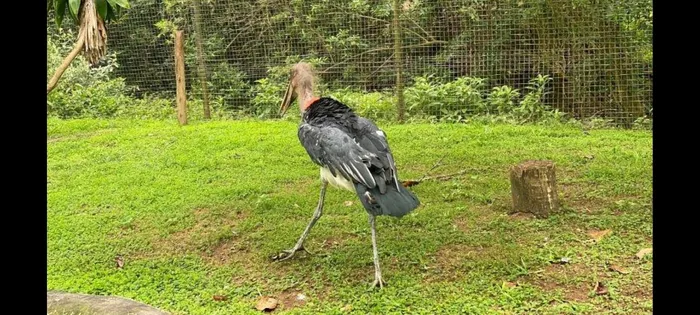Norris the stork is back to make babies

Norris the stork has returned to Crocworld Conservation Centre in Scottburg, Umzinto. He and his new mate, Merry, are to mate in the hope of producing more Marabou Storks. Picture: SUPPLIED

Norris the stork is back at Crocworld and he has some important work to do — making babies. Norris was a captive hatchling who hatched at Johannesburg Zoo on January 1, 2010. He recently celebrated his 15th birthday.
Mr Busani Mthiyane, animal curator of Crocworld Conservation Centre, said Norris arrived at Crocworld on July 20, 2015 where he enjoyed a happy time with his mates.
“Norris was housed in our Crocworld aviary for some time. He had been somewhat anxious and unsettled. However, with much dedicated care, he has calmed down significantly and we feel he is ready to be living with his mates once again,” Mr Mthiyane said.
He added that Crocworld has many breeding programmes which are instrumental in furthering the genetic diversity of threatened species. Norris has shown significant success in the programme, fathering a number of chicks over the years, including two last year. He added that they are patiently monitoring and observing Norris behaviour towards his mate. The introduction of this Marabou stork comes with the intention of increasing their breeding rate as they have two males and one female on display. Marabou Storks breed during the dry season only and play an important role in the ecosystem by scavenging on carcasses, Mr Mthiyane said.
So far Norris has fathered three children with his previous mate, Samara. Unfortunately Samara died and now he has a new mate, Merry.
“There is a need to breed more storks because the regional population of Marabou Storks in South Africa is relatively small, estimated at around 340 to 520 mature individuals. Marabou Stork is currently classified as ‘Least Concern’ by the International Union for Conservation of Nature (IUCN). This makes them vulnerable to various threats, and breeding programmes help stabilise and potentially increase their numbers. These programmes also enhance genetic diversity which is crucial for the long-term health and resilience of the species,” said Mr Mthiyane.
Mr Mthiyane said Marabou Storks are not known to be friendly or playful, however, during the breeding season, males perform courtship displays to attract females. This includes bill-clattering and spreading their wings. These unique displays intend to establish dominance and attract a mate, he said.
“Norris is certainly one of the beloved characters at Crocworld, and we’re excited to be introducing him to the public once again. He is joined by many fantastic characters that reside at Crocworld, among them Henry the Nile crocodile. Henry is considered the world’s longest-living Nile crocodile in captivity, he just celebrated his 124th birthday. There’s his best mate, Colgate, who is in his 90s and almost as massive as Henry. Then there’s Elliot the Emu, and Sekhuru the African Fish Eagle. We encourage visitors to head to Crocworld to meet them all,” said Mr Mthiyane.
Related Topics: